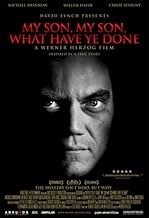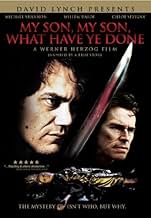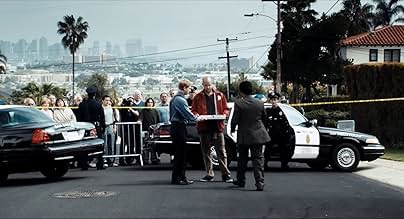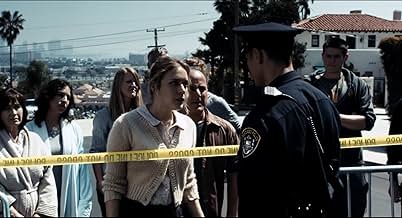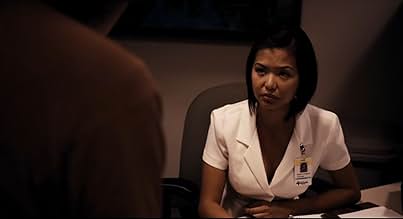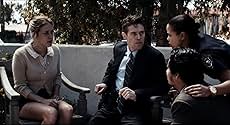CALIFICACIÓN DE IMDb
6.1/10
11 k
TU CALIFICACIÓN
Inspirado por un crimen real, un hombre comienza a experimentar eventos desconcertantes que lo llevan a matar a su madre con una espada.Inspirado por un crimen real, un hombre comienza a experimentar eventos desconcertantes que lo llevan a matar a su madre con una espada.Inspirado por un crimen real, un hombre comienza a experimentar eventos desconcertantes que lo llevan a matar a su madre con una espada.
- Premios
- 2 nominaciones en total
Irma P. Hall
- Mrs Roberts
- (as Irma Hall)
Julius Morck
- Phil
- (as Julius Mørck)
- Dirección
- Guionistas
- Todo el elenco y el equipo
- Producción, taquilla y más en IMDbPro
Argumento
¿Sabías que…?
- TriviaMany of the cast and crew on Enemigo interno (2009) reunited with director Werner Herzog to produce this film. Major examples include actors Michael Shannon, Brad Dourif and Irma P. Hall, cinematographer Peter Zeitlinger, and editor Joe Bini.
- ErroresIn the escalator scene, which takes place in Calgary but which was filmed at the San Diego Convention Center, one can clearly see a row of palm trees outside.
- Citas
Brad Macallam: [referring to his flamingoes] What do you mean by birds? They're my eagles in drag!
- ConexionesFeatured in At the Movies: Venice Film Festival 2009 (2009)
Opinión destacada
Of all the films I saw at the 2010 Edinburgh International Film Festival, this is the only one (apart from Savage Messiah) that deserved, for me, repeated viewings. I'm not implying it's the best ever Werner Herzog film. Or the best David Lynch film (if you feel his 'producer' role influenced it that much, as many did.) But I was captivated by what 'My Son' had actually done. Even though it is obvious from the start. Less obvious though is the Greek tragedy playing out in his mind which, in his head, is mostly what he's actually doing. Apart from that, I wanted to re-watch so many scenes. Crazy stuff that is made believable simply by the conviction with which it is presented. The first viewing had me gripping my seat in open-jawed amazement throughout, only to breathe a sigh at the end and wonder what I was getting so excited about. Flamingo hostages? Give me a break! (Even if you are supposed to call them 'eagles in drag.' Or ostriches.) God is in the kitchen. On a tin of oatmeal to be precise. But this isn't comedy (though you may laugh) and consider, if you will, that, "The cruel bitch of female passion can break apart the yolk that joins a pair; and force apart the dark embrace of beast and man alike."
Now we're getting somewhere, and it's hypnotically arty, fiendishly funny, upsettingly evocative of nasty dread around the corner, and aren't you pleased that dreams are only dreams and this is only a film.
Story One. The Truth.
The film is based on the true story of Mark Yavorsky, a San Diego man who stabbed his mother to death, inspired by his recent role as Euripides' Orestes in a production of The Eumenides at University of California, San Diego. Or was it Aeschylus' version. Or maybe it was Electra, by Sophocles. (The Truth isn't very interesting anyway, so you can skip this bit.)
Story Two. The Cinematic Truth.
Brad McCullum (Michael Shannon) is maybe in his late twenties but lives with his eccentric and overbearing ("You know you like your jello!") mother. Brad adores mum (played by Grace Zabriskie) with a Norman Bates –like unhealthy shine. This being a Herzog movie, it goes with saying that he's crazy, although the line between 'crazy' and 'madly inspired actor-artiste' is deliberately nebulous. He is engaged to a very normal girl (played by Chloë Sevigny, whose characters do seem to specialise in dubious boyfriends, don't they?). Their shared passion for theatre somehow makes this believable. Willem Dafoe and Michael Peña are bizarrely and beautifully caricatured Lynch-style detectives for whom the unusual is just another day's work. Rather more interesting for them is a tale of the plain clothes policeman getting busted for speeding by another plain clothes policeman. They're about as normal as the blood-related cops in Tarantino's Deathproof. If a murder won't fit on the report sheet, it will by the time they've finished with it. They are also about the sanest thing we've got short of lovesick Sevigny or an exasperated theatre director.
So Brad doesn't get to kill mum on stage cos he's far too 'inspired' to be managed by the director and gets kicks off the cast. He runs the stage sword (which is meant to be Greek but isn't, because Brad prefers it that way) through his mother several times as they are sitting down for morning coffee with their nice neighbours. This occurrence is treated in a fairly routine way near the beginning of the film, so we can enjoy the rest of the time in extended flashbacks to understand what really happened and why.
Story Three. The Real Truth.
Orestes (with whom Brad identifies) is the last link in a bloody line of godly nastiness. Tantallus had been hard done by, and invites the gods to dinner to see if they are real. When they turn up, he serves his son in a stew (They didn't have jello in ancient Greece). The gods puke, but the bits of half-chewed flesh live on to father more cannibals. Only Orestes can lift the curse, but has to kill his mother to do it. If that sounds crazy, it probably was. But Orestes is something of dramatic symbol for anyone whose crime is mitigated by extenuating circumstances. Mad or not, you do what you have to do. "At least some people act a role," says Brad, "others play a part." Historically, it's about replacing matriarchy.
This is a film where you are entranced throughout, awaiting the dark brooding fury or the mother's 'vengeful hounds from hell.' (Or at least an ostrich that steals yours glasses while you're cleaning them.) It even has a dwarf. At the end, you might wonder what on earth you were getting so worked up about, but it's hard to deny you enjoyed the ride. Analyse it too closely and you might not like the extended freeze frames which are ludicrously pretend (you can see Sevigny moving, understandably, as she tries to eat her horrid jello). I did, but for someone people who spotted it the first time round, the joke had worn off. For others, it might be a re-hashing of Lynch/Herzog staples without breaking radical new ground. I suspect I may have to change my 'rating' to five stars if I slink back and see it yet again.
Now we're getting somewhere, and it's hypnotically arty, fiendishly funny, upsettingly evocative of nasty dread around the corner, and aren't you pleased that dreams are only dreams and this is only a film.
Story One. The Truth.
The film is based on the true story of Mark Yavorsky, a San Diego man who stabbed his mother to death, inspired by his recent role as Euripides' Orestes in a production of The Eumenides at University of California, San Diego. Or was it Aeschylus' version. Or maybe it was Electra, by Sophocles. (The Truth isn't very interesting anyway, so you can skip this bit.)
Story Two. The Cinematic Truth.
Brad McCullum (Michael Shannon) is maybe in his late twenties but lives with his eccentric and overbearing ("You know you like your jello!") mother. Brad adores mum (played by Grace Zabriskie) with a Norman Bates –like unhealthy shine. This being a Herzog movie, it goes with saying that he's crazy, although the line between 'crazy' and 'madly inspired actor-artiste' is deliberately nebulous. He is engaged to a very normal girl (played by Chloë Sevigny, whose characters do seem to specialise in dubious boyfriends, don't they?). Their shared passion for theatre somehow makes this believable. Willem Dafoe and Michael Peña are bizarrely and beautifully caricatured Lynch-style detectives for whom the unusual is just another day's work. Rather more interesting for them is a tale of the plain clothes policeman getting busted for speeding by another plain clothes policeman. They're about as normal as the blood-related cops in Tarantino's Deathproof. If a murder won't fit on the report sheet, it will by the time they've finished with it. They are also about the sanest thing we've got short of lovesick Sevigny or an exasperated theatre director.
So Brad doesn't get to kill mum on stage cos he's far too 'inspired' to be managed by the director and gets kicks off the cast. He runs the stage sword (which is meant to be Greek but isn't, because Brad prefers it that way) through his mother several times as they are sitting down for morning coffee with their nice neighbours. This occurrence is treated in a fairly routine way near the beginning of the film, so we can enjoy the rest of the time in extended flashbacks to understand what really happened and why.
Story Three. The Real Truth.
Orestes (with whom Brad identifies) is the last link in a bloody line of godly nastiness. Tantallus had been hard done by, and invites the gods to dinner to see if they are real. When they turn up, he serves his son in a stew (They didn't have jello in ancient Greece). The gods puke, but the bits of half-chewed flesh live on to father more cannibals. Only Orestes can lift the curse, but has to kill his mother to do it. If that sounds crazy, it probably was. But Orestes is something of dramatic symbol for anyone whose crime is mitigated by extenuating circumstances. Mad or not, you do what you have to do. "At least some people act a role," says Brad, "others play a part." Historically, it's about replacing matriarchy.
This is a film where you are entranced throughout, awaiting the dark brooding fury or the mother's 'vengeful hounds from hell.' (Or at least an ostrich that steals yours glasses while you're cleaning them.) It even has a dwarf. At the end, you might wonder what on earth you were getting so worked up about, but it's hard to deny you enjoyed the ride. Analyse it too closely and you might not like the extended freeze frames which are ludicrously pretend (you can see Sevigny moving, understandably, as she tries to eat her horrid jello). I did, but for someone people who spotted it the first time round, the joke had worn off. For others, it might be a re-hashing of Lynch/Herzog staples without breaking radical new ground. I suspect I may have to change my 'rating' to five stars if I slink back and see it yet again.
- Chris_Docker
- 26 jun 2010
- Enlace permanente
Selecciones populares
Inicia sesión para calificar y agrega a la lista de videos para obtener recomendaciones personalizadas
Detalles
- Fecha de lanzamiento
- Países de origen
- Idioma
- También se conoce como
- My Son, My Son, What Have Ye Done
- Locaciones de filmación
- Productoras
- Ver más créditos de la compañía en IMDbPro
Taquilla
- Presupuesto
- USD 2,000,000 (estimado)
- Total a nivel mundial
- USD 76,739
- Tiempo de ejecución1 hora 31 minutos
- Color
- Mezcla de sonido
- Relación de aspecto
- 1.85 : 1
Contribuir a esta página
Sugiere una edición o agrega el contenido que falta

Principales brechas de datos
By what name was Hijo mío, hijo mío, ¿qué has hecho? (2009) officially released in India in English?
Responda


